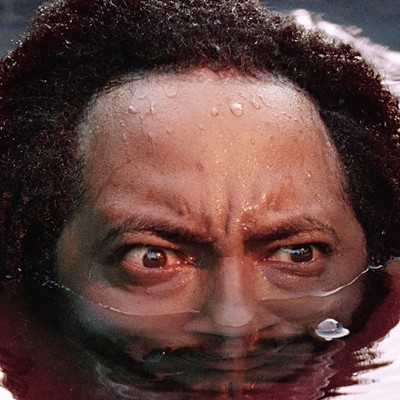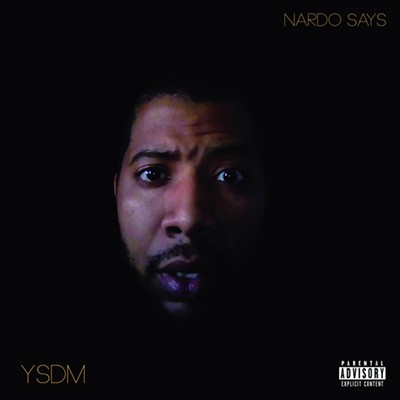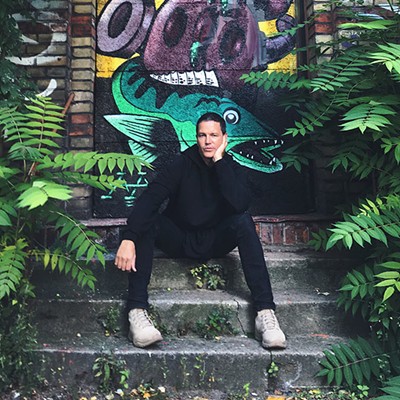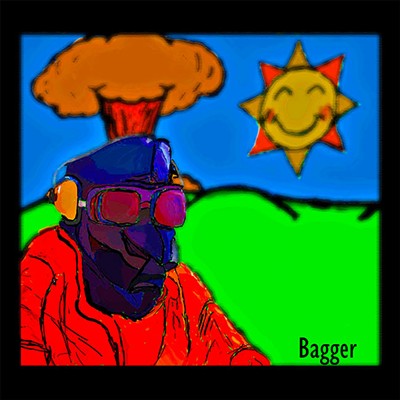Wednesday, September 5, 2012
Extended Q&A: Frank Turner
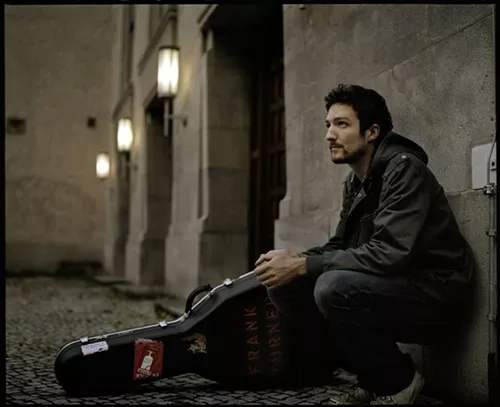
- Photo courtesy of Erik Weiss
- Frank Turner
I talked last week with Frank Turner about his forthcoming record and the tour that brings him to Mr. Small's next week. Here's a less-abridged version of the interview, for those of you who just can't get enough.
You're ramping up to work on a new record there in Burbank?
We're doing a week of pre-production here right now, then we head off for a week to do the tour, and come back after the tour to make the album.
And what's pre-production like for you — is it an exciting time, a painful time?
Well, I haven't actually worked with Rich Costey before, so to some degree, I'm not entirely sure! Though I'm a huge fan of his work. He's a person I've been wanting to work with for a long time. But essentially it's just the moment to tune my self-criticism to yet more intense levels. I try my best to be hypercritical of what I do anyway, but this is when all the new songs, which I'm terribly excited about, will be subjected to laser-like, microscopic nit-picking, and torn apart and turned upside-down. And hopefully made better.
Will you do entire rewrites of songs or just little tweaks?
Again, hard to say — I'd like to say that I think I'm beyond the entire-rewrite section, but there is one song where I think the verse and the chorus are possibly the wrong way around. But we'll find out ... like, today. But yeah, it's very toothcomb kind of stuff, with arrangements and that sort of thing.
And is there a title for the record yet?
I've got a few hanging around, but I don't want to jinx it — plus, historically, I have a habit of changing my mind up to the finish line. So, we shall see. I've got some ideas.
Where and when did you do the writing for this album — is there a thematic string to the material you're putting together?
To me, writing is an ongoing process. I know that there are bands out there that set aside writing time, that kind of thing, which strikes me as a slightly weird idea. Because to me, songwriting is more like trying to hail a cab: I feel like there are ideas going past, and you stick your arm out and every now and again you get one. As with everything I've done in my solo career, these songs have been written at various points in hotel rooms and on tour buses and that kind of thing, since I put a cap on writing for the previous record.
I try not to get too analytical about the process or what I do, songwriting. In terms of sort of themes for records, I think the last record that I did England Keep My Bones, it ended up being a record about England, and about mortality and this kind of thing. But I didn't sit down and go, "I am now going to write an album about the following things!" It was more a question of, once the body of work had sort of congealed around a central point. Once the recording process is done, I can sit back like anybody else and start to go through it and analyze what it is that's been bothering me lately. So, what this new record will be about still remains to be seen.
So listening back to a record is sort of like looking in a mirror.
Yeah, basically. I'm almost like — you and I both will be on the analysis side of it starting at the same time.
That must be exciting and slightly terrifying at the same time.
Very much so. To repeat a well-worn platitude, I'm very excited about the new material, and about the songs and about recording. Obviously, I would say that — if I wasn't saying that, we wouldn't be about to go into the studio. But my aim is always to try and better myself, and I think I can make a record that's better than the ones before.
You blogged that you were feeling a little tentative about doing your recording in L.A. Have you always recorded in England in the past?
It's always been in England — but I haven't repeated myself in a studio to date, it's always been different places. I think the wariness thing is just, it's such a kind of tired cliche — English band achieves a small degree of success, goes to L.A., blows a ton of money on a record, or, you know, adopts American accents and starts driving Cadiillacs. It's just sort of — I don't think of myself as a nationalist, but I think that kind of, my cultural Englishness is a big part of my identity, and of the music that I make — hopefully in the way that Springsteen is always from New Jersey, no matter which part of the world he's in. I don't want to start making records that sound American, at least not self-consciously so.
You don't want to make a sunny, California record just because you're in California.
Right. But what I'm hoping is, these songs, like the others, have been written in different parts of the world, and quite a lot of England, Keep My Bones was written on tour in the States, and it came out as quite an English-sounding record.
You keep a blog fairly regularly — most bands or artists keep some manner of social media profile, but it seems like communicating with the written word is important to you, maybe more so than it is to other bands.
Yeah, I think that may well be true. On a certain level, it's important; a better way of putting it for me is maybe that I find it interesting. The Internet — well, first of all, I'm very bored with people trying to say the Internet is a good thing or a bad thing. That's like trying to say the Industrial Revolution was a good thing or a bad thing; it's kind of irrelevant. Regardless of the moral value you ascribe to it, it just is. It's had a lot of interesting effects on the process of being a musician, and one of the positive effects it's had in my view is that it sort of helps break down the barrier between performer and audience. I've never really been a fan of that kind of slightly Wizard of Oz-esque curtain between the world of being a musician, and the people who listen. That kind of Marie Antoinette-esque attempt — I hate it when you see a band talking about, like "the fans," we're doing it for "the fans," and it's this sort of faceless morass. There's a haughtiness in there that I don't like. And living in a world where the economics of the music industry is in such flux, I think it's good to inform everyone of the economic realities and the practical realities behind it. I think this is less the case now than it was a few years ago, but I still have kids come up to me in the bar and think since they've heard my song on the radio, I'm a millionaire. And it'd kind of like, 'Wow," where to even start with that? It's interesting. It's fun.
So, to clarify, you're saying you're not a millionaire?
I am not a millionaire. This is a total aside, but I was at a festival in Germany the other day, and there was a German, like, hair-metal band playing, and they had a song talking about how they were in a band because they wanted money, sex and power. And I thought to myself, "Maybe the middle one, but options one and three — I think you're in the wrong job!"
You recently played the opening ceremonies of the Olympics — what was it like getting that call?
That was a very weird experience all around. And not in a bad way! Just, it was all very surreal. The opening ceremony was directed by Danny Boyle, the film director, of whom I am a big fan anyway. And my manager got a call from Danny Boyle, saying, "Can we have a meeting?" And obviously we said, "About what?" And they said "We can't discuss it over the phone." We had to sign non-disclosure agreements and all this business. But yeah, it's that simple: Danny's a fan of my music — which was news to me, and kind of disarming. And he said "Would you be up for playing some songs?" and I said ... "Yes." It was quite funny, actually, he said "Don't answer me straight away; you can go away and have a think about it," and it was like, "I don't need to go away and think about it! I'll tell you right now what the answer is!"
Like I said, I don't really consider myself to be a nationalist, really, or a patriot or whatever you want to use, but having said that, it is the only Olympics in my country in my lifetime. And it was kind of cool to be part of history.
Did you at any point feel any ambivalence about being involved, or feel like there was a certain viewpoint that you had a responsibility to bring to the table?
Not particularly. Mainly because of Danny — the opening ceremony was very much his vision, his baby. Of course I'm aware there are corporate sponsors, but you know what? Every time I play a venue they're selling beers in the venue. I'm not sure I feel compromised by that. And so, why — yes, there were large amounts of corporate sponsorship around the Olympics, but it wasn't directly impacting me, I wasn't getting paid by anyone, it was sort of a moot point to me.
One of the terms we throw around here to describe the music that you make it "folk punk" — what's your relationship to that genre term?
You know, yeah, I've got better things to do in my life than get worked up about genre terms. I've always felt the genre terms serve a certain purpose up until the point when all the people in the current conversation have heard the music you're talking about, after which point, who gives a fuck? There's a large folk influence in what I do, there's a large punk influence in what I do, and if you put a gun to my head and asked me to describe what I do, I would probably tell you I was a country singer. But, like I say, I don't really care that much. If people want to call me folk punk, that's fine.
You used to be in louder bands — what made you feel that you wanted to change directions and pursue the music you play now?
The very beginning of it was just, when I was touring with hardcore punk bands — I was in a noisy, shouty band, playing with other noisy, shouty bands, people were always putting noisy, shouty music on in the van. And as sort of a refuge from that, I started listening to records like Springsteen's Nebraska, the Johnny Cash American Recordings series, stuff like that, just as a kind of counterpoint. Then the last hardcore group I was in, Million Dead, broke up rather messily, and I suppose in a way, I needed something of a different direction. I knew I wanted to keep playing music, but the idea of forming another hardcore band at that point filled me with kind of tired disgust. And so, I think after that, I wasn't really sure if it was going to work, or going to last, but I started doing these shows and instantly felt like I was in the right place in life.
Is there something else that you want to do in life besides music?
This is definitely my number-one passion and I would absolutely love to be Neil Young when I'm older: To be old and still making records that have something to say, and all the rest of it. Whether or not that's going to happen, who knows? I think anyone with any degree of intelligence who's a musician has a plan B. The statistics are against us, is a nice way of putting it. I've always said I want to be a history teacher — but I may now have too many tattoos to be a history teacher.
Tags: Frank Turner , FFW>> , Image


